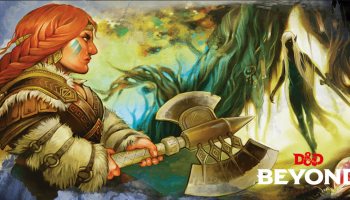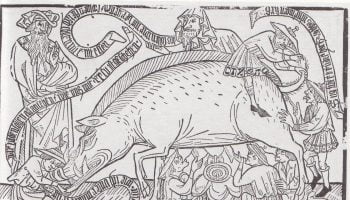From Chaucer to Fetish Porn to the White House
A vile new slur has taken root in American politics. If you read internet comments sections, the political subsections of Reddit, or are politically active on Twitter, you may have encountered it: “cuck”. The rise of Trump and the mainstreaming of the American alt-right fringes has injected this bizarre, antiquated word into the political discourse (along with a derivative portmanteau “cuckservative”). It is crucial for us to understand the coded language used by hate groups—and now those in the halls of power—to attack those around them in case you encounter it in the wild: on the street, in your classrooms, by your Breitbart-reading uncle, or on TV.
Rising from relative obscurity, “cuck” and its derivatives have become a favorite way for alt-righters to insult anyone who does not fall in line with their ultra-reactionary ideologies. But before it became a staple on the neo-Nazi edges of 4chan, Reddit and the comments sections of Breitbart, it was a medieval word, conveying a very medieval idea.
The Vile Origins
Cuck, as you might expect, come from the word cuckold, an insulting word for a man whose wife is cheating on him. The Oxford English Dictionary places its first attested use in the mid-thirteenth century Middle English poem “The Owl and the Nightingale”. The poem recounts a comic debate between an Owl and a Nightingale, and here the Owl is taking a remarkably forward-thinking stance on gender relations. He is discussing a common occurrence—a man loses interest in his wife, and pursues other women. He then begins to abuse his wife—in the original Middle English:
Al Þat heo deÞ him is unwille,
al Þat heo spekeÞ hit is him ille:
an oft hwan heo noʒt ne misdeÞ,
heo haueÞ the fust in hire teÞ.
Þ[er] is nan mon Þat ne mai ibringe
his wif amis mid swucche Þinge:
me hire mai so ofte misbeode,
Þat heo do wule hire ahene neode.
La, Godd hit wot! heo nah iweld,
Þa[h] heo hine makie kukeweld.
Or, in Modern English:
Everything she does he objects to,
everything that she says irritates him,
and often, when she’s not doing anything wrong,
she gets a punch in the mouth.
There’s no man who can’t lead
his wife astray with this kind of behaviour;
she can be ill-treated so often
that she resolves to satisfy her own needs.
God knows, she can’t help it
if she makes him a cuckold.
In other words, if a woman is being abused by her philandering husband, it’s no surprise that she would cheat on him too. Seems reasonable. But, when this idea was viewed through the lens of the toxic, patriarchal masculinity of the Middle Ages, it took a dark turn.

Men who were cuckolds may have only had themselves to blame (compounded by the medieval idea that women were more sexual than men). But he was shamed not because of his behavior, but because of hers. This generated intense anxiety in men, since one of the central aspects of being a man meant controlling the women in your life—an idea that had been enshrined into law. And court records show the results: as Derek Neal writes,
“fights, wife-beatings and even homicides could originate in men’s anxiety that their wives had made them cuckolds, or in the use of the word cuckold as an insult between men.”
This word cuckold and the idea of the shamed, cuckolded man, shows up in some of our most celebrated literature. From Chaucer’s Miller’s Tale:
This carpenter hadde wedded newe a wyf,
Which that he lovede moore than his lyf;
Of eighteteene yeer she was of age.
Jalous he was, and heeld hire narwe in cage,
For she was wylde and yong, and he was old
And demed hymself been lik a cokewold.
This carpenter had recently wedded a wife,
Whom he loved more than his life;
She was eighteen years of age.
Jealous he was, and held her narrowly in confinement,
For she was wild and young, and he was old
And believed himself likely to be a cuckold.
to the Morte D’Arthur, to nearly half of Shakespeare’s plays and poems, the anxiety about being cheated upon—and thus losing control of your woman—became pervasive. There is a gendered opposite, “cuckquean” first seen in 1546. But this did not catch on to nearly the same degree—women’s infidelities aroused anxiety; men’s infidelities elicited praise.
By the 20th century, the word had faded enough into obscurity that the word was often defined in the margins of editions of Shakespeare or Chaucer. Part of this was likely due to changing gender and sexual norms—while few people like being cheated on, the invention of reliable birth control meant that infidelity less often resulted in children. The rise of feminism and the sexual revolution meant that, among progressive households, men and women saw each other increasingly as equal partners rather than property. In the past two decades, with the LGBTQ rights movement has come an acceptance of sexual partnerships that relax or do away with monogamy entirely—the rise of polyamory and what Dan Savage has termed “monogamish” relationships.
But then, the backlash.
Porn
The word cuckold, like so many things do, saw its rebirth in porn. The last decade’s renaissance in free streaming video content online has resulted in an incredible diversification of the porn industry. The famous meme “rule 34 of the internet” states: “If it exists, there is porn of it—no exceptions“, and that holds true here; “cuckold porn” found a healthy niche market on the internet. Cuckold porn features, as you might expect, scenarios where a man is humiliated by his wife having sex with another man. And, putting America’s racist id fully on display, often the man she is having sex with is black—apparently the ultimate humiliation and outrage for some consumers.
It has been assumed by the news outlets reporting on the lurid history of the word “cuck” that those men who consume cuckold porn are sexually submissive, aroused by putting themselves in the shoes of the man being cuckolded. But in light of the way cuck has been appropriated by the alt-right, it is clear there is another audience still: those who, even literally, get off watching a man be humiliated. This lays bare the power dynamic that was always inherent in the use of the word—in order for a man to be dragged down by it, there has to be another who feels it lifts them up.
And more, implicit in the idea of “cuck” and cuckold porn is that the husband in this scenario, either willingly or because of his inherent weakness, is giving up that which is rightfully his to a person who should be the enemy. There is a homosexual implication here—that the cuckolded man secretly (or not-so-secretly) desires the cuckolder. And because the racial dynamics within much of cuckold porn calls back to the earliest days of the Ku Klux Klan, where central to their mythology was the fear that liberals were giving their white women over to black men. All of this leads to an image of degradation and weakness that is loaded not just with sex, but the worst homophobic and racist politics.
Mainstreaming Cuck as a Crypto-slur
The word cuckold was perfect for the alt-right. Its meaning is tantalizingly filthy, its sound abrasive, and its relative obscurity fits well in a world where language is coded and cryptic (both to establish the in-group from the out and as a method of obfuscation). They took the word, shortened it to cuck (easier to tweet), and deployed it as their insult du jour. Anti-feminists steeped in the toxic masculinities of Reddit’s /r/RedPill, 4chan’s /pol/, or GamerGate used it to shame the men they despised.

In July 2015, early in the campaign, the term mutated into “cuckservative”. The neologism, as The Washington Post reported:
“…burned up Twitter as fans of Donald Trump’s politicking warred with the movement conservatives who opposed it.”
Soon, any conservative who opposed Donald Trump, whether opponents like Jeb Bush and Marco Rubio, or mainstream conservative pundits and commentators, was tarred with the term. And it is easy to see how Trump could be seen in the cuck paradigm—he was not just beating his opponents, but humiliating them, sliming their wives and families. It did not matter that none of it was true. What matters is that he forced them to watch as he violated their families.
It was at this point that the word cuck metastasized and took on new meanings, as it became a catch-all insult for any man they despised. In some circles, it has become synonymous with “race traitor”, as the Southern Poverty Law Center describes:
“White supremacists have been more than happy to co-opt the terminology, even tailor its definition to further describe politicians who don’t fall in line with the white nationalist cause.”
The Anti-Defamation League has found it being used in anti-Semitic circles
“by white supremacists to describe a white Christian conservative who promotes the interests of Jews and non-whites over those of whites.”
Unsurprisingly, but tellingly, the term began being used on Steve Bannon’s website Breitbart (which I refuse to link to)—not just in the comments sections, but in headlines like “’Cuckservative’ is a Gloriously Effective Insult”, and “Don’t Be a Cuck, Zuck! Accept My Debate Challenge”.
It is easy for language such as this to go unnoticed by those who are not its target. If you find it used in your classrooms, your social circles, or by your political opponents, you now know what you are dealing with.
And, I will be frank. This literally medieval toxic masculinity will now occupy the White House—bringing with it the worst corners of the racist, anti-Semitic and xenophobic right wing. I will be the first to argue that comparisons to the Middle Ages are overused within political discourses. But in this case, the term, and those who use it, should be confined to the dustbin of history.





Great post Paul. The fact that even the explanation became sickening on at least three occasions during the read says a lot.
What I do find particularly worrisome is that as with a number of other terms of late, it gets repeated on media, on social media, and before you know it, is doing the rounds in workplaces and school playgrounds quite often without the context and something which should have been just left to die becomes a buzzword. It’s been going on for years now, and facilitated by shrewd, or bludgeoning but intensive, media coverage – quite often with substantial money thrown at it.
We’ve been dealing with it for the last decade. The PUA (Pick-Up Artists) vile movement began using the term in ’09/’10, I’ve seen it used on ‘masculinist’ MRA-type sites as well, and as shaming in comment feeds, most recently, relating to Gamergate, where male feminists, supporting Sarkosian and other women in the gaming industry, were derided as ‘cucks’.
There is a whole generation of angry, largely white, men, between the ages of 15 and 35 whos narrowing economic and educational opportunities, combined with a culturally inflated sense of entitlements under patriarchy, have been radicalised by serious right wingers in politics and white terror groups. They are the terrifying ‘middle’ of this fascist resurgance. Many of them are electronically literate, almost all of them genuinely feel oppressed, not realising that the source of their oppression is the very socio-economic system that allowed men like Trump, Pence and Bannon into power in the first place, coupled with exactly the sort of hyper-patriarchal culture they, themselves, represent.
You forgot to mention the shortening of the word CUCKOO,
used for people that repeat what others say without thinking.